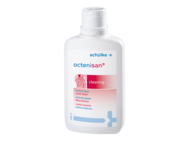
Preoperative washing before elective surgery
Postsurgical wound infections are a common complication in surgical interventions. Not only do they lead to increased mortality and prolonged hospitalisation, they also result in enormous costs for the health care system.
According to estimates, postsurgical wound infections cause annual costs of up to 3 billion euros in the German health care system.1
Postsurgical wound infections have therefore increasingly become the focus of public attention. The keyword “patient safety” has in particular become the focus of postsurgical wound infections in orthopaedics.
Due to the increasing number of people with hip and knee endoprostheses worldwide, implantation of artificial joints is already considered a routine procedure. Although the SSI (Surgical Site Infection) rates after this type of procedure are relatively low, their increasing frequency also increases the economic and health effects.
Postsurgical wound infection rate is 0.5% for knee endoprostheses and between 1% and 3% for hip endoprostheses.2,3 SSI are the number one cause of revision operations following knee replacement surgery and the third most common cause following hip replacement. This can result in a doubling or tripling of the hospital stay, for example after a hip replacement. A stay of up to 28 days causes therefore significantly higher costs.
Patients with postsurgical wound infections following knee replacement surgery are also hospitalised significantly longer than uninfected patients (up to 24 days). The average cost of treating an infected patient is $116,000, compared to $28,000 for a patient free of infection.4
Left untreated, a SSI can penetrate deep into the joint and develop into a far more serious – and costly – periprosthetic joint infection.
In the US, preoperative patient decontamination prior to knee surgery could save between $0.8 and $2.3 billion annually5. Early preventive measures are therefore strongly recommended.6
[1] BVMed, background information on postoperative wound infections,
http://www.krankenhausinfektionen.info/ki-de/kikrankenhaus-infektionen/post-operative-wundinfektionen
[2] Mistry J.B. et al., 2017: Decreasing the Incidence of Surgical-Site Infections after Total Joint Arthroplasty.
[3] Reference Centre for Surveillance of Nosocomial Infections (NRZ), 2017: Module OP-Hospital Infection Surveillance System (OP-KISS). Reference data. Calculation period: January 2012 to December 2016.
[4] Kapadia B.H. et al., 2014: The economic impact of periprothetic infections following total knee arthroplasty at a specialized tertiary-care center.
[5] Kapadia B.H. et al., 2013: Economic evaluation of chlorhexidine cloths on healthcare costs due to surgical site infections following total knee arthroplasty.
[6] Kurtz S.M. et al., 2012: Economic burden of periprosthetic joint infection in the United States.





















